System requirements
WR-AOTS™ Ver. 2.10 requires PC, and Stereophonic headphones or earphones. It can also connect Nintendo® Wii® Remote Plus Controller™ and GPS.
-
PC
Microsoft® Windows® 7 / 8 / 8.1 / 10 (32 / 64 bit) are recommended. Windows® Vista is not recommended because of poor sound quality. Windows® RT is not supported.
In order to avoid incorrect action, any peripheral devices using COM Port (e.g. RS232C) shall be removed in advance.
-
Stereophonic headphones or earphones
Not specified, but it must be able to connect to PC. You can buy it for dozens Euros/Dollars.
If the instructor listens to the sounds with the trainee, two sets of headphones can be used through the forked adapter. You can buy it for several Euros/Dollars.
* The closed type headphones are recommended for trainings of the obstacle perception. On the other hand, if you use the closed type headphone, you must note that the trainee cannot hear the verbal instruction of the instructor.
-
Pointing device such as mouse.
Left and right buttons are required.
-
Nintendo® Wii® Remote Plus Controller™ (please prepare if possible)
If possible, please prepare the latest version (the 3rd generation). You can buy it for about 40 Euros/Dollars.
Sometimes built-in bluetooth of PC cannot connect Wii® Remote Plus Controller™. In this case, please test the following items:
- Please test external Bluetooth adapter through USB. The following products are recommended. You can buy it for about 30 Euros/Dollars.
- Please test Bluetooth application software. The following products are recommended. You can buy it for about 30 Euros/Dollars.
-
GPS (not recommended now)
USB-connectable NMEA-format GPS can be used. However, using GPS is not recommended now.
* The following products are tested. You can buy it for about 40-80 Euros/Dollars.
- Globalsat BU-353-W (Windows® 7 and before)
- Globalsat BU-353-S4 (Windows® 8 and later)
Application user interface
This is the explanation of WR-AOTS™ Ver. 2.10 application software window.
Monitor, icons, buttons, and checkboxes in the window are operated by the left button of pointing device such as mouse. The parts number 3-17 can be operated by keyboard. The parts number 1-17 will be presented by screen reader and Braille display.
* Please see Quick start to start application.
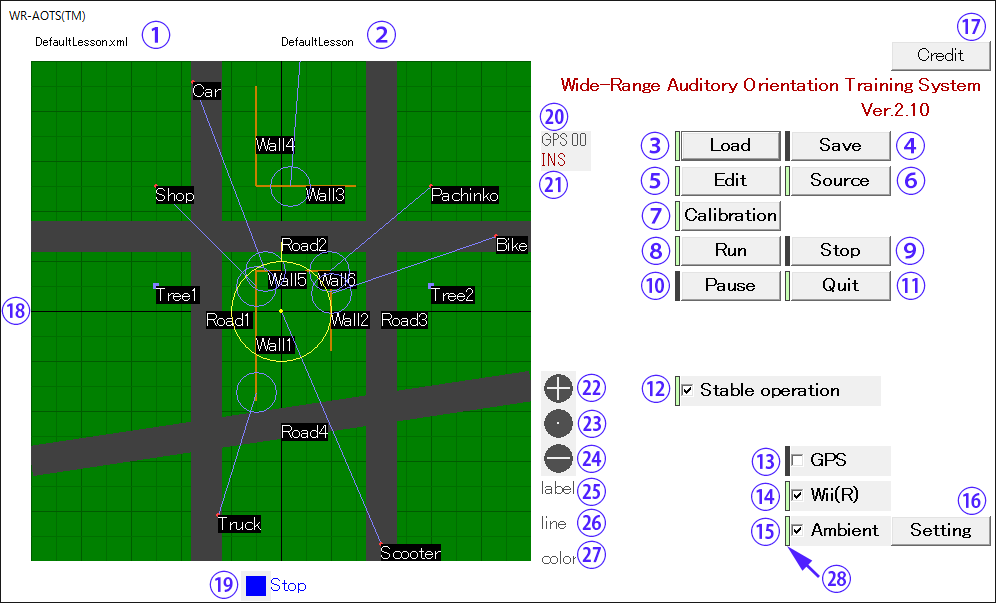
-
Training field file name
Name of the XML-formatted file that contains the training field data.
-
Training field name
Name of training field.
-
Load button
Button to open window to load training field file. This is used to load the training field data file saved in XML format.
-
Save button
Button to open window to save training field file. This is used to save the edited or newly made training field data in XML format file.
-
Edit button
Button to open window to edit training field. This is used to edit or newly make training field data.
-
Source button
Button to open window to show the XML source code of training field.
-
Calibration button
Button to record the initial measured values of GPS and the built-in sensors of Wii® Remote Plus Controller™, and calibrate them. The calibration must be done in advance to run training field.
-
Run button
Button to run training field.
-
Stop button
Button to stop training field. If you push Run button after this, the training field starts from the initial situation.
-
Pause button
Button to pause training field. If you push Run button after this, the training field starts from the situation just after paused.
-
Quit button
Button to quit the application.
-
Stable operation checkbox
Checkbox to switch on/off
the stable operation mode
that uses only stable outputs of gyro and Wii® Remote Plus Controller™. When you use, please keep switch on. -
GPS checkbox
Checkbox to switch on/off GPS. If GPS is not connected, this checkbox must be unchecked. When you use, please keep switch off.
-
Wii checkbox
Checkbox to switch on/off Wii® Remote Plus Controller™. If Wii® Remote Plus Controller™ is not connected, this checkbox must be unchecked.
-
Ambient checkbox
Checkbox to switch on/off ambient sounds coming from distant places.
-
Ambient button
Button to open setting window of ambient sounds coming from distant places. In the setting window, kind of noise, direction and volume can be set.
-
Credit icon
Icon to open window to show credit information.
-
Training field monitor
Monitor to display the training field. You can scroll it by dragging inside.
-
Action indicator
Indicator to display action status of training field (Run, Stop or Pause).
-
GPS indicator
Indicator to show number of available GPS satellites, and also show GPS positioning is available/unavailable in light (red)/light-out (black).
-
INS Indicator
Indicator to show inertial navigation by Wii® Remote Plus Controller™ acceleration sensor is available/unavailable in light (red)/light-out (black).
-
Zoom in icon
Icon to make the training field monitor zoom in.
-
Standard size icon
Icon to make the training field monitor standard size.
-
Zoom out icon
Icon to make the training field monitor zoom out.
-
Name icon
Icon to switch on/off displaying names of the elements in the training field monitor.
-
Sound line icon
Icon to switch on/off displaying the sound lines (from sound sources to trainee) in the training field monitor.
-
Color icon
Icon to switch color/grayscale of the training field monitor.
-
Available/Unavailable/Mandatory indicator
Indicator to show status whether each button or checkbox is operatable or not, or operation is mandatory in advance to run, in whole light (green)/whole light-out (black)/ partially light (red and black).

Available indicator 
Unavailable indicator 
Mandatory indicator
Quick start
First of all, let's start WR-AOTS™ Ver 2.10! In this time, you don't need to connect neither GPS nor Wii® Remote Plus Controller™. Please prepare just PC with WR-AOTS-210
folder, mouse and headphones.
-
Start the application.
Please make sure that you have the following six items in
WR-AOTS-210
folder.- WR-AOTS.exe
- vadmgr.dll
- Sounds folder
- Lessons folder
- Languages folder
- HRTF folder
WR-AOTS.exe
is the execution file of this application. Please double-click on this file and start the application.* If the error occurs when the application is activated, please see Q&A of Manual.
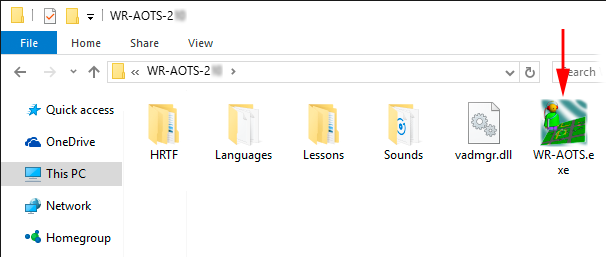
-
Main window will open.
The Main window shown in Application user interface will open with blank and black training field monitor, training field file name
NoFile.xml
and training filed name-No Field
. -
Load training field data.
Please push Load button to open window to load training field file.
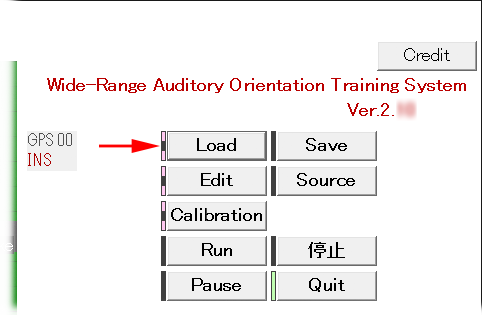
When the window to load training field file opened, please select training field data file and load it from
English
folder inLessons
folder.DefaultLesson.xml
will be selected by default, please pushOpen
button to load it in this time.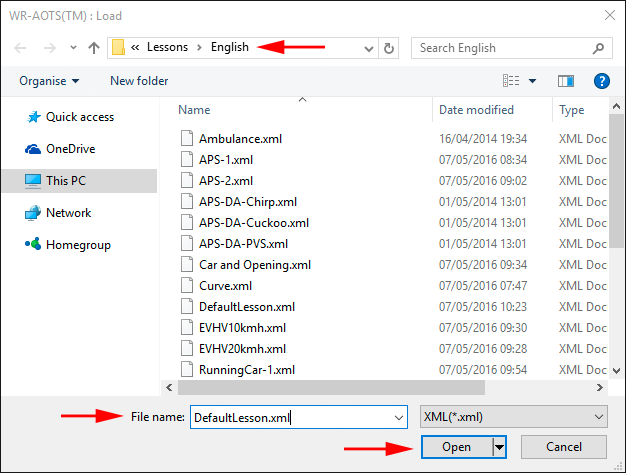
When the loading is complete, the training field will be displayed on the training field monitor.
-
Calibrate sensors (you don't use them now).
As a next step, GPS and the built-in sensors of Wii® Remote Plus Controller™ must be calibrated. But they are not used in this time, so that the following procedure is superficial.
Please uncheck GPS and Wii checkboxes.
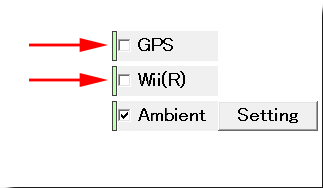
When you push Calibration button, question window to ask
Calibration OK?
will open. Please push OK button.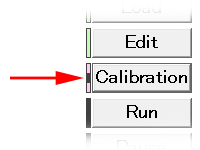
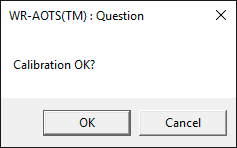
The question window will close. As a matter of fact, calibration is not done in this time.
-
Run now.
Let's run finally. Please connect stereophonic headphones or earphones to audio output of PC. For trainee's safety, please set sound volume at 0 in advance.
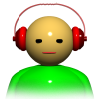
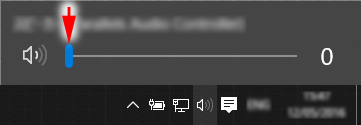
Please push Run button.
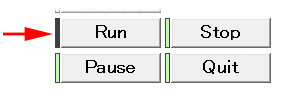
-
Sounds come out.
When you push Run button, the Sounds in the training field displayed on the monitor will start to move and play sounds. Please adjust sound volume to listen comfortably.
If it is the first time for the application to run since the Windows® operating system started, it may takes at longest two minutes to start sounds after
Run
button is pushed.
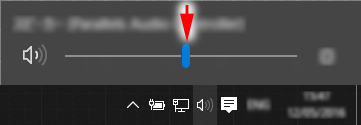
The grid in the training field monitor are 5 m/div. Upper side is south, and left side is east. The crossing point of the south-north and east-west axes is the origin of the training field. The bright (yellow) round dot surrounded by the bright (yellow) circle stands for the head position of the Trainee in the training field. The bright (yellow) short line coming out from the bright (yellow) circle stands for the head direction of the Trainee in the training field. The slightly bright (red) round dots stand for sources of the Sound. The slightly bright (orange) lines stand for the Walls that reflect and insulate the sounds.
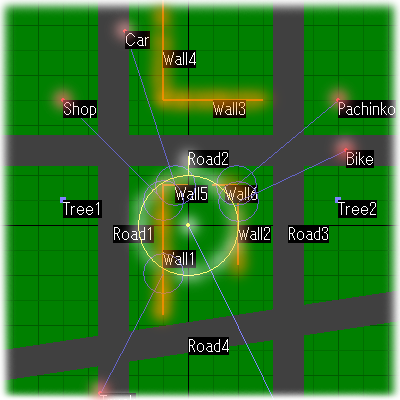
The (blue) thin lines coming out from the sources of the Sound stand for the sound lines (sound paths from the Sound to the Trainee). If the sound line is interrupted by the Wall, the (blue) thin circle will appear at the interruption point. This shows that the sound is insulated by the Wall. The (gray) fat lines stand for the Roads, and the (purple) square dots stand for the Marks. The Roads and the Marks do not influence on the sound propagations.
The sounds presented through the headphones are reproduced the sounds that may be heard by the Trainee in the training field in 3-D manner. When the Trainee moves or turns in the training field, the presented sound will also change. The Doppler effect that occurs on the moving sound sources, and the obstacle perception that occurs when the Trainee approach the Wall (in this case, the Wall will bright (color changes from orange to white)) are also reproduced.
In order to move the Trainee in the training environment, you can use mouse, Wii® Remote Plus Controller™, and GPS. The followings are the explanations of their roles. The explanations of method to use them are skipped here.
- Mouse can move the Trainee in the training field displayed on the monitor directly. It is used when the instructor moves the trainees and presents the sounds to him/her.
- Keyboard can be used when the instructor, or the trainee him/herself, moves the trainees and presents the sounds to him/her.
- Wii® Remote Plus Controller™ can move the Trainee in the training field as the same motion as the trainee's head motion measured by it fixed on the head (headphones). It is used when the trainee listens to the sounds with walking and orienting his/her head by him/herself.
- GPS can also move the Trainee in the training field as the same motion as the trainee's motion measured by it carried by the trainee. It is mainly used when the trainee walks long distance. It must be used with mouse, keyboard or Wii® Remote Plus Controller™ because it cannot measure the head orientation.
* In WR-AOTS™ Ver. 2.10, using GPS is not recommened.
-
Operate the monitor.
The monitor can be zoomed in/out by using the Zoom icons. The monitor can be scrolled by dragging inside of it by mouse. When the
. (dot)
of Zoom icons is clicked, the monitor will be reset to the initial size and position.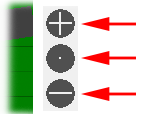
-
Stop or pause the run.
Please push Stop button to stop the run. Please push Pause button to pause the run.

If you push Run button after pushing Stop button, the training field will start from the initial situation. If you push Run button after pushing Pause button, the training field will start from the situation just after paused.
-
Quit the application.
Please push Quit button to quit application.


 National Institute of Advanced Industrial Science and Technology, Japan
National Institute of Advanced Industrial Science and Technology, Japan